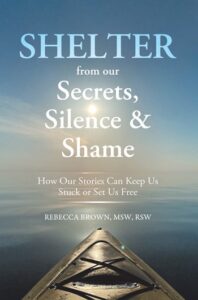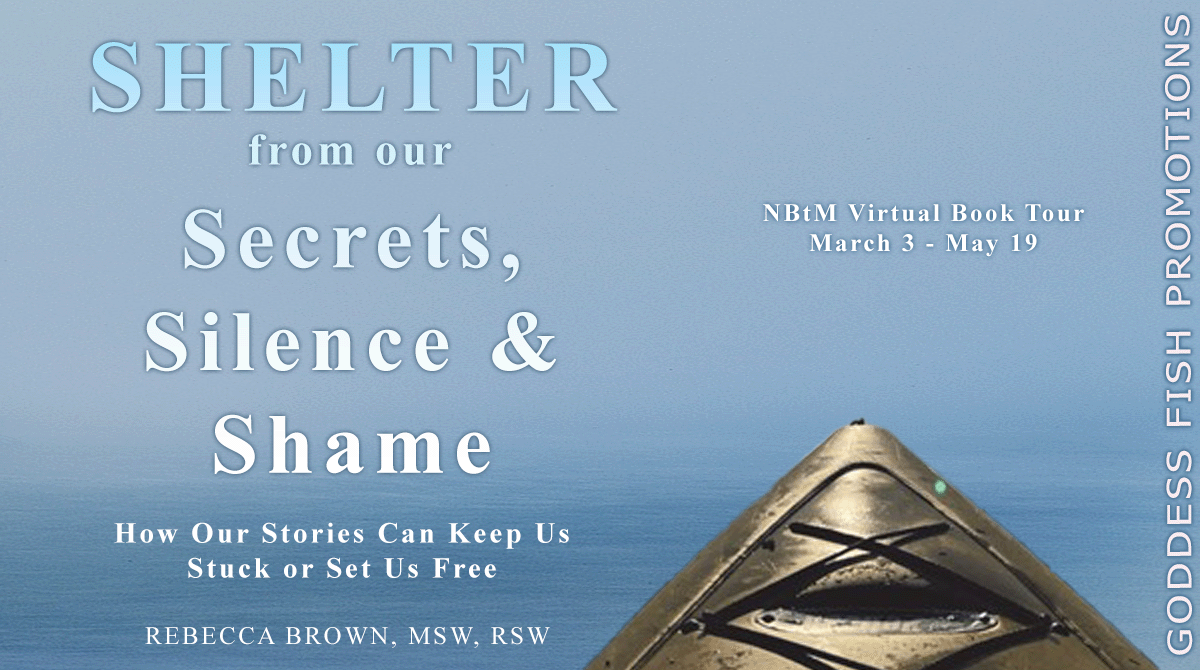 Writer Rebecca Brown joins me today to talk about her self-empowerment book, Shelter from our Secrets, Silence & Shame; How Our Stories Can Keep Us Stuck or Set Us Free.
Writer Rebecca Brown joins me today to talk about her self-empowerment book, Shelter from our Secrets, Silence & Shame; How Our Stories Can Keep Us Stuck or Set Us Free.
During her virtual book tour, Rebecca will be giving away a $15 Amazon or Barnes and Noble (winner’s choice) gift card to a lucky randomly drawn winner. To be entered for a chance to win, use the form below. To increase your chances of winning, feel free to visit her other tour stops and enter there, too!
Bio:
Rebecca Brown has a master’s degree in Social Work and a career spanning more than 35 years within the medical, child protection and trauma fields. Rebecca is an Assistant Professor in the Department of Family Medicine, Western University, in London, Ontario and delivers workshops and conferences throughout North America on the topics of Vicarious Trauma, PTSD, Compassion Fatigue and Resilience to First Responders and professionals in the trauma and health fields. She holds a designation as Trauma Specialist from the American Academy of Experts in Traumatic Stress.
For over 20 years, Rebecca’s career was in the child protection field as a Supervisor of a front line child protection team and was Coordinator of the Critical Incident Debriefing Program. Her expertise includes providing Psychological First Aid through international Disaster Relief, such as the Paradise, California Wildfire. Her clinical time is shared between a Family Medical Centre and her private practice which includes certification in Equine Assisted Therapy (EAGALA) Rebecca is the Coordinator of the Equine Facilitated Wellness Program at Prance – Therapeutic Equestrian Centre on the shores of beautiful Lake Huron.
Welcome, Rebecca. Please tell us about your current release.
My book is called Shelter from our Secrets, Silence & Shame; How Our Stories Can Keep Us Stuck or Set Us Free, and my goal is that reading Shelter will be a gift of self-compassion and self-discovery. My hope is that it will be read with a highlighter in hand, pages folded down, re-read, recommended to a friend, and used as a guide to start sharing your own stories with those you love.
Shelter provides strategies and tools to help reframe the thinking patterns we have developed, and offers tools to recognize when we are suffering from our own thoughts, feelings and actions. Resilience-building strategies are woven through the pages, and encouragement for the lifelong journey of collecting moments of awe and happiness.
What inspired you to write this book?
As a mental health clinician, I have been a safe place for many to seek shelter from their secrets, silence and shame. Inspired to finally slow down, stop running from myself and share my own story, I have found ways to seek and savour my own shelter, so I decided that a book would be a good way of doing this.
Excerpt from Shelter from our Secrets, Silence & Shame:
PROLOGUE
I am floating.
On the water
calm
clear
soft
quiet.
Dusk,
the sun is setting.
The sky will hold light
for another half an hour
or so.
The beauty is often just after the sun sinks into the water,
then the colours are spectacular.
Or just softer.
It’s been a long day;
hard
heavy
yet healing.
I have no words left in me.
I cannot talk
or listen anymore.
I need quiet
peace
calm
presence.
I have found the shelter that I seek today
on the open water.
My kayak is my shelter this day.
I will paddle until I physically feel the release in my body.
I will watch the sun set until I find the peace in my soul.
I hope to sleep tonight.
Rebuild my resilience.
I will wake and do it all again.
I may need to seek shelter differently tomorrow.
Or not.
Knowing that I must still seek shelter sometimes,
makes it safe for me to continue in this work that I love.
CHAPTER ONE
2017
I am standing at the podium in the grand ballroom of the conference centre outside Austin, Texas. There are over five hundred law enforcement officers, real-life Texas sheriffs, judges, lawyers, child protection workers, therapists, social workers, and juvenile justice workers in the audience. I’m very aware that I’m one of the few people in the room not carrying a gun.
The room is now hushed, lights lowered, all eyes on me, waiting for me to speak.
And all I can think is, What do I know?
So that’s how I start my keynote address.
I clear my throat, take a deep breath, steady myself against the podium, and start to tell my story.
“Good morning, my name is Rebecca Brown, and you’re probably wondering, as I am—what do I know? Let me share with you what I know about Vicarious Trauma, Compassion Fatigue, and Resilience as they relate to those of us working in the field of trauma.”
Over the next hour, I share evidence about how the body and mind absorb stress from the work we do and the lives we’ve lived. I explain that our childhood experiences; our primary traumas; and our drive or calling to be helping professionals, first responders, health care workers, teachers, or social workers can take a toll on us if we don’t find ways to balance our work with the person we have become. I don’t have time on this day to get into my own history in detail, other than to share that I, like many of them, have a back story that has led to the career I’m in. My job is to help them recognize the “cost of caring” for other human beings and how they can build their resilience in the face of this extremely challenging work.
I give my talk.
The room erupts in applause.
A dozen people line up to thank me or say a few words at the end of my session.
One man in particular stands out.
He is well over six feet tall and wearing a full Texas sheriff uniform. He has greying hair and is likely close to the end of his career. He pumps my hand as he shakes it, almost leaving it numb. He thanks me for my talk. “Great stuff,” he says.
And then he hands me his business card.
But it’s not quite a business card.
It’s a photo card, like a baseball card, or a kid’s hockey card, with the player’s name, position, and smiling face as they stand posed to take a shot in their team uniform.
Only this is of a man on a black horse. More precisely, it’s this man, a Texas sheriff on his beautiful black police horse. “I thought you’d like to have this,” he says. “My horse is Canadian, like you.”
And then he says something that has stayed with me, because he couldn’t be more right: “Everyone in this business should have a good horse!”
He meant the business of trauma. I couldn’t have agreed more. I still have his “business card.”
Two years later, I went back to Texas to teach a three-day workshop on resilience to youth detention workers. I tried to look up my Texas sheriff, but he had retired. I hope he’s finding more time to enjoy his good horse.
I’ve shared the story of our brief encounter and his photo card with many police officers over the years. And every one of them agrees: horses can heal humans. I’ve found shelter with horses. Sometimes in the saddle, but mostly not. My story will get there. Eventually.
I finished my keynote address and spent the rest of the day at the conference on Youth in the Justice System. People stopped me in the halls of the hotel, telling me how much they enjoyed my talk. Later that evening, I went for a run.
And then I drank a bottle of wine and went to bed.
What exciting project are you working on next?
Well, since this book is about my own life, personally and professionally, I can honestly say that I continue to live out the stories in my book every day. I have had a tremendously positive response to Shelter, and I hope to spend some time over the next few months getting the word out to readers.
 When did you first consider yourself a writer?
When did you first consider yourself a writer?
Well, my book was published on January 7, 2022, and the first copies were bought the next day. So, I’d say I considered myself a writer on January 8, 2022.
Do you write full-time? If so, what’s your work day like? If not, what do you do other than write and how do you find time to write?
No, I work fulltime, dividing my clinical time between a medical centre, my home office and a farm where I provide equine assisted therapy, using horses in the sessions. I wrote this book during the pandemic, from 2020 to 2021, although I was working from home most of time, I needed a distraction to help me deal with the uncertainty of the world.
What would you say is your interesting writing quirk?
I get most of my inspiration and ideas for chapters of my book while I’m running first thing in the morning, or in my kayak, watching the sun set on beautiful Lake Huron where I am so lucky to live. As soon as I get back in the house, I have to write the idea down, or it will be lost in my mind of endless spinning and spiraling thoughts.
As a child, what did you want to be when you grew up?
I vacillated between wanting to be a nurse or a teacher. Ironically, I ended up in medical social work, on faculty at a university in the department of family medicine teaching medical students and doctors about dealing with the impact of trauma on their own lives.
Anything additional you want to share with the readers?
I hope that my book introduces readers to some experiences and ideas that they might never have had, like running the Boston Marathon or working with horses. My goal was to write my story so that the reader would feel that they were with me on my journey, and can relate to their own life experiences in a new way.
Links:
Website | Instagram | Goodreads | Amazon US | Amazon CA | Indigo Chapters | Barnes and Noble | Smashwords

